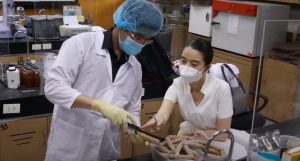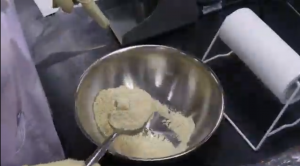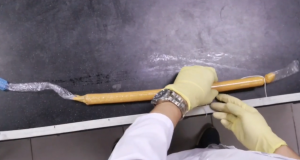A UST research team, led by UST Graduate School Secretary Assoc. Prof. Elizabeth H. Arenas, Ph.D., sought to reduce food waste through the development of “soysage,” a gluten-free, vegan sausage made from okara, the pulp that remains after pureed soybeans are filtered in the production of soy milk and tofu.
Arenas presented the research project during the Department of Science and Technology Collaborative Research and Development to Leverage Philippine Economy (DOST-CRADLE) symposium held on January 18, 2022.
Industrial food processing generates massive amounts of waste, and the unused byproducts, which are commonly disposed of and not maximized, lead to environmental problems and economic loss for businesses, particularly micro, small, and medium enterprises (MSMEs).
Banawe Soybean Curd Food Products Corporation (BSCFPC), which produces soy milk, taho, and bean curd sheet products, also generates 200kg to 300kg of okara as a byproduct. They linked with the UST team through the DOST’s Government-Academe-Industry or GAIN workshop held in August 2019, and the one-year research project to make use of okara officially commenced on June 6, 2021.
The world production of okara, mostly coming from Asian countries, is about 1.4 billion tonnes, according to the team’s presentation. This large quantity of food byproduct is discarded or used as animal feed. To reduce food waste, the okara will be made into a high-volume food product, such as sausages.
The project’s team leader Arenas shared in an interview that, “Currently, there is a strong market demand for sausages, but unfortunately, high consumption of processed meat products like sausages is associated with an increased risk of chronic diseases. Thus, we envision a healthy vegan sausage made from okara, which is free of artificial food coloring and chemical preservatives.”
Okara is a low-cost source of bioactive compounds that are good for human health. It is high in dietary fiber and contains an appreciable amount of protein, oil and phytochemicals, such as isoflavones, added Arenas.
At present, the product is still being finalized to determine the ideal formulation and the team plans to conduct chemical analyses to determine its nutrient composition.
The team is composed of Research Center for Natural and Applied Sciences (RCNAS) researchers, Assoc. Prof. Elizabeth H. Arenas, Ph.D., who teaches at the Food Technology Department, and Assoc. Prof. Franelyne P. Casuga, Ph.D., who is the Laboratory Supervisor of the Pharmacy Department. With them are research assistants Mr. Kevin Rae Ngo and Ms. Kerstin Mariae G. Ponsaran, who are UST BS Biochemistry graduates, and laboratory aide Chelsea Apple T. Torio.
The project is expected to end on June 5, 2022. Once completed, the product formulation and process will be adopted by BSCFPC.


